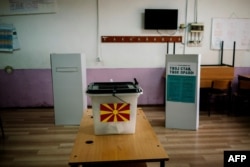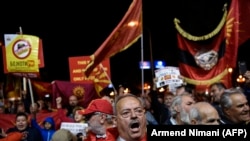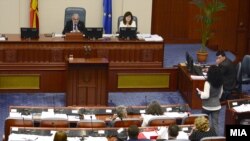The outcome of referendum in Macedonia has been music to the ears of pro-Kremlin analysts, with some proclaiming that the results are victory for Vladimir Putin and will bring a halt to the process of Macedonia joining NATO.
In Skopje’s city center, one can see the deserted “boycott” protest camp in the park across the parliament building, with placards and tents standing idle. While tourists stroll on Skopje’s main square and the city seems quiet, worried locals call on the government and opposition parties to reach an agreement before parliament reconvenes and the debate turns messy.
In the walkup to the referendum, many local news outlets in Macedonia picked up the anti-Western narrative. According to the German Marshall Fund’s Asya Metodieva this was the result of Russian efforts and a stream of fake news on social media.
Still, Macedonian political analyst Vladimir Petreski told Polygraph.info that this played only a minor role in the outcome of the referendum. More significant were the inflated number of voters on the Macedonian electoral registry list that has not been upgraded since 2002 which includes emigrated and deceased persons and the number of Macedonians who have left country because of its ailing economy.
“More people voted for the government’s plan [for Macedonia joining NATO and the EU] than for any other party or coalition in any elections held after the country’s independence,” Zoran Zaev, the country’s prime minister, told the Financial Times on October 1.
In the September 30 referendum, Macedonian citizens were asked: “Do you support EU and NATO membership by accepting the agreement between Macedonia and Greece?"
The agreement would result in Macedonia changing its name to the Republic of North Macedonia. A day later, the Central Election Committee declared the referendum had not passed because of low voter turnout. Only 37 percent of Macedonia’s 1.8 million registered voters cast ballots, while a 50 percent turnout or higher was needed.
However, 92 percent of the 650,000 voters who did cast ballots supported the name change and EU and NATO integration.
Russian Media Narratives
During the October 1 talk show on Sputnik Radio, the host said Macedonia would be “cannon fodder” were it to join NATO in defiance of the referendum result.
A Russian analyst from a Serbian analytical center told the Russian international broadcaster RTVi that Macedonia could be blackmailed to enter NATO through Western pressure in the upcoming parliamentary ratification of the agreement with Greece.
“If that scenario doesn’t turn out, an early general election could be called… the referendum was a big deception,” said Ekaterina Pomortseva.
Pomortseva claimed that Montenegro had been “blackmailed by the West” to join NATO and the same thing was being done to Macedonia. Montenegro joined NATO in June 2017, after Russia-backed groups tried to prevent this by a failed coup in October 2016.
Fedor Lukyanov, editor-in-chief of Russia in Global Affairs, a magazine published by the Russian government-owned newspaper Rossiskaya Gazeta, claimed the referendum question skewed the voters.
“[T]he [referendum] organizers were interested not in solving the really significant problem with the name, but in using it to force a geopolitical choice,” Lukayanov wrote. “Not surprisingly, blatant politicking by one side (the pro-Western one) triggers a corresponding response by the other.”
Macedonia’s Declining Population
However, Russia’s advocates did not address what some Macedonia officials say is the real reason why the September 30 referendum did not attract 50% of the vote – overblown numbers in the Macedonian electoral registry list and massive emigration out of the the country over the last 15 years.
Political analyst Vladimir Petreski and entrepreneur Robert Hot told Polygraph.info that the electoral registry list does not correspond with the actual Macedonian population. The electoral registry list is based on the country’s last census, conducted in 2002.
The previous Macedonian government, formed by the rightist VMRO-DPMNE party and the Albanian Democratic Union for Integration (DUI), failed to carry out a census scheduled for 2011. Earlier this year the special prosecution opened a criminal case related to the failed census in 2011. Defendants are ex-VMRO-DPMNE leader Nikola Gruevski, and Ali Akhmeti, DUI’s current chief.
“If the government wanted to carry out a successful referendum, it should have directed its efforts to more deep cleaning of the electoral registry and changing the referendum law regarding turnout,” said Hot, who is a member of the Macedonian trade and economic chamber.
Macedonia is a totally different country from what it was in 2002, said Vladimir Petreski, a political analyst and editor.
“In 2002, Macedonia had 244,740 elementary school students,” Petreski noted. “In 2016, this number decreased to 185,992 students. In addition, almost 100,000 Macedonians got Bulgarian citizenship since 2002. A majority of them moved out of the country because they can get legal employment in the EU,” he said.
Emigration from Macedonia over the last decade has been massive. An International Republican Institute poll conducted June through July 2018 found that 46 percent of Macedonians have a family member who left the country to live and work abroad during the last three years.
Referendum Results – What Now?
Looking at the results of the referendum, and the number of voters who did exercise their rights, Zaev is confident that Macedonia’s government has a clear mandate to push for changing the country’s name in order to integrate the country more closely with the West.
Under the Referendum and Other Forms of Direct Citizens’ Expression Law, if a referendum is called, its results can be regarded either as “consultative” or “obligatory.” The government opted to view the September 30 vote as consultative.
And so, since the referendum did not pass because of insufficient turnout, the debate over the name change will now go to Macedonia’s parliament, where a two-thirds majority is needed to adopt constitutional changes. That means at least 80 of the legislature’s 120 members would have to support the name change deal.
The governing majority, plus the opposition parties who support the deal, have only 71 seats, nine short of the required two-thirds majority.
Hot said that Zaev made a mistake in calling for the referendum. “Any opposition parliamentary member who might have been supportive of the name change will now be proclaimed as a traitor if they join the majority,” he said.
“Look at [Greek Prime Minister] Alexis Tsipras: he never called for a referendum in Greece regarding the Macedonia name issue.,” Hot added. “They will just ratify the agreement in the parliament and the deal is done. For example, Switzerland puts only communal and local questions to a referendum. Solving the big national issues, such as a country’s name change, cannot be delegated to the people – it is the sole responsibility of the national institutions elected by the people.”
Meanwhile, Russian news picked on the idea that any parliamentary vote would turn badly and that Zaev would be defeated in early elections that could be called as result of the failed vote. Euro Asia Daily cites a Serbian expert who claims that under the Constitution, any referendum result is obligatory, failing to mention that under the referendum law, plebiscites could be called either obligatory or consultative. Article 8 of the law states that if a referendum called is consultative its result is not obligatory and can be overruled.








